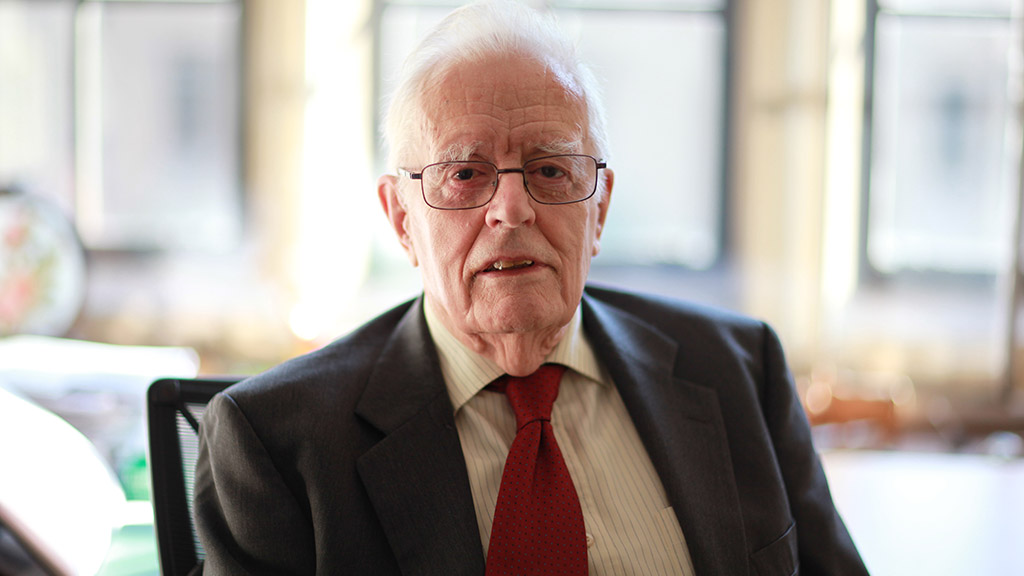
David Cox, Basic Sciences laureate in the 9th Frontiers of Knowledge Awards, dies aged 97
David Cox, winner of the 9th Frontiers of Knowledge Award in Basic Sciences, has died at the age of 97. A former Professor of Statistics and Honorary Fellow at the University of Oxford’s Nuffield College, Cox shared the BBVA Foundation award with his colleague Bradley Efron for their development of “pioneering and hugely influential” statistical methods that have proved indispensable for obtaining reliable results in a vast spectrum of disciplines from medicine to astrophysics, genomics or particle physics.
20 January, 2022
“Cox and Efron’s techniques are used on a daily basis in the practice of statistical science, and have made an enormous impact in all the sciences which rely on the analysis of data,” said the Frontiers committee in its award citation. In today’s world of Big Data, when not only science but also technology and economics feed off vast quantities of data, Cox’s work has taken on even greater relevance.
In his paper “Regression Models and Life Tables,” published in 1972, Cox described the workings of a powerful tool to estimate the time interval between two events dependent on identifiable factors. What became known as the “Cox model” can tell us, for instance, about the mortality risk of patients under treatment, the school dropout rate in a given population, or the risk of business bankruptcy, and has found uses in cancer research, epidemiology and sociology, and for such varied ends as testing the durability of industrial products or predicting the likelihood of earthquakes.
At the time of developing his model, David Cox was already a reputed researcher. Trained at the University of Cambridge, his move into statistics was due to military imperatives at the time of the Second World War. Before earning his PhD, he had been employed at the Royal Aircraft Establishment, and he afterwards worked for the Wool Industries Research Association. His subsequent career would take him to the University of Cambridge, the University of London, Imperial College London and, since 1988, the University of Oxford.
The story of the Cox model started with a question posed independently by various friends studying patient survival time: How can we tell how much the treatment applied is influencing survival compared to other features inherent to each patient? “It took me three or four years to develop a solution,” he recalled, “and finally my work got published in an academic journal. Rather to my surprise, lots of people found it useful, which I am very happy about.” For Cox, the most interesting applications of his research had to do with organ transplants and the treatment of life-threatening diseases such as cystic fibrosis.
On hearing of the Frontiers Award, Cox declared himself “enormously surprised and gratified” by the sheer range of scientific problems his method had helped address. For example: “It is used in the study of cancer patients, to determine what aspects of the treatment are determining their progress. There are many factors at work in an individual’s survival, including their social background, sex and age. Which are the most relevant?” This is the kind of issue that can be broached with his technique, published in what is now the second most cited statistics paper in modern scientific literature.
Professor Cox was convinced that his methods, and statistical tools in general, would become more and more central to the practice of science, increasingly reliant on the analysis of massive data sets. “The area of Big Data,” he reflected, “is certain to raise statistical issues.”
Bio notes
Born in Birmingham (United Kingdom) in 1924, David Cox studied mathematics at St. John’s College (University of Cambridge) and obtained his PhD from the University of Leeds in 1949. At the start of his career, he was employed at the Royal Aircraft Establishment (1944-1946), the Wool Industries Research Association (1946-1950), and the Statistical Laboratory at the University of Cambridge (1950-1955). He then moved to the University of London, where he was Reader and then Professor of Statistics at Birbeck College (1956-1966) and Professor of Statistics at Imperial College of Science and Technology (1966-1988), for a time heading its Department of Mathematics (1969-1973). In 1988, he was appointed Warden at Nuffield College, Oxford University, and joined the University’s Department of Statistics, continuing to work there even after his retirement in 1994.
His paper “The Regression Analysis of Life Tables” (1972) revolutionized the theory and practice of statistical methods for medical research and is the second most cited in the statistics area, with some 30,000 Web of Science citations and 42,000 in Google Scholar. This same publication won him the Kettering Prize and Gold Medal for Cancer Research in 1990, the only time the honor in question had gone to a mathematician. In 2014, Nature placed it 16th in its list of the top 100 scientific papers of all time in any discipline. The influence it has exerted was also recognized in the bestowal on its author of the first International Prize in Statistics in 2016.
Cox was an honorary member of more than forty universities and learned societies, among them the Royal Society of London, which granted him its Copley Medal in 2010, the British Academy and the U.S. National Academy of Sciences. He also held the Guy Medal of the UK’s Royal Statistical Society (Silver in 1961 and Gold in 1973), the Weldon Memorial Prize from the University of Oxford (1984) and the Max Planck Forschungspreise (1992), and was president of the International Statistical Institute from 1995 to 1997. He received a knighthood for his achievements in 1985.

